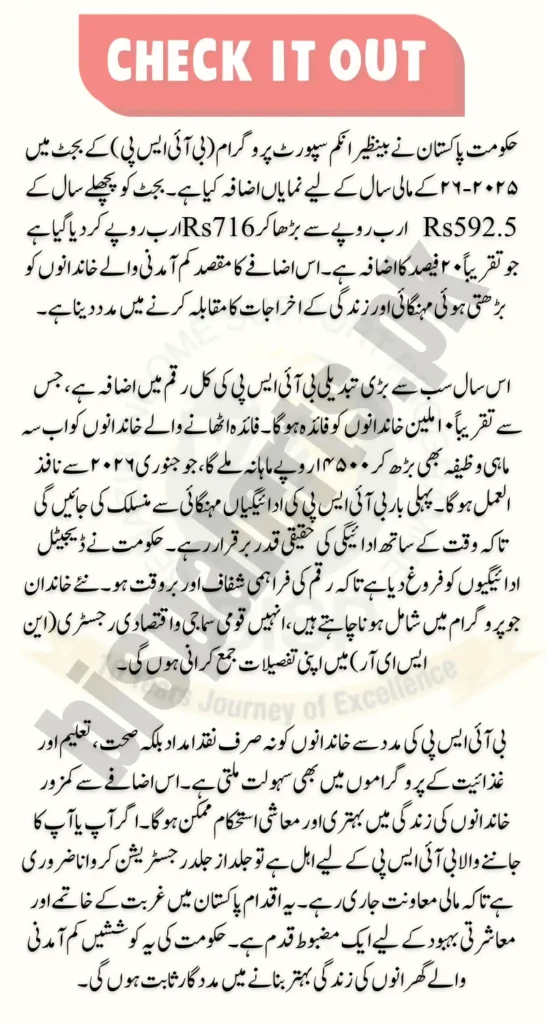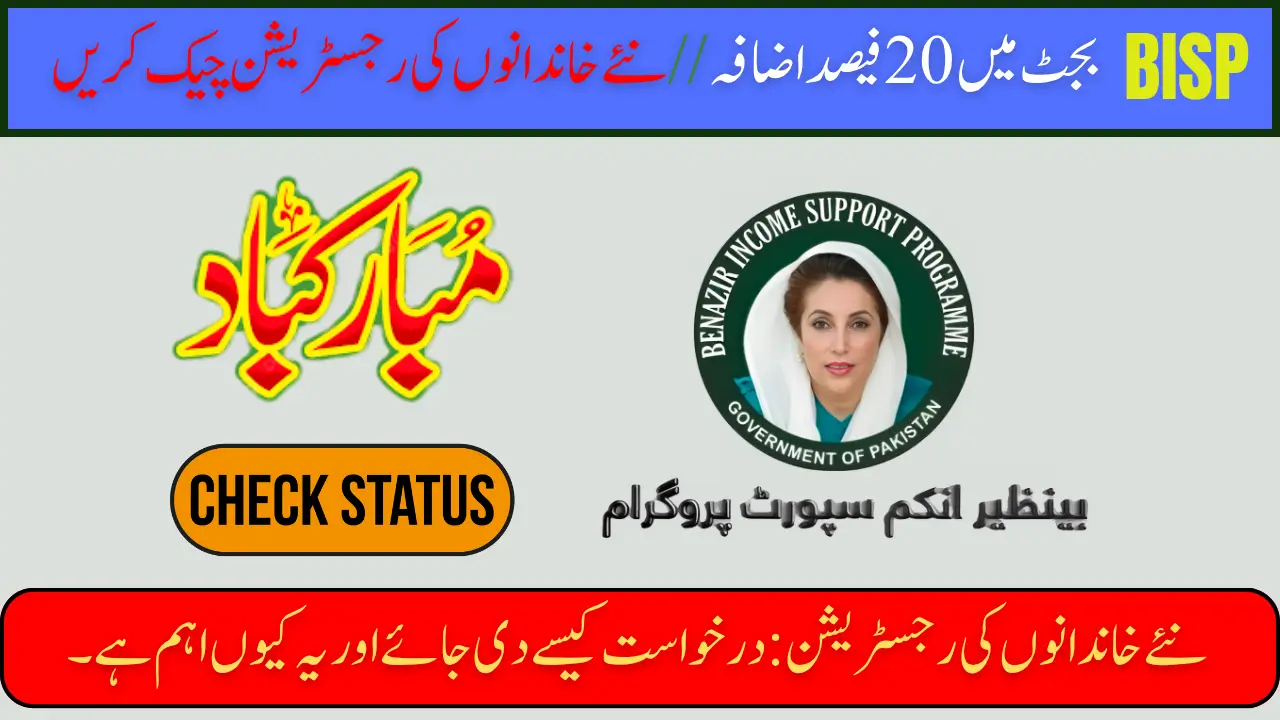The Government of Pakistan has announced a significant increase in the Benazir Income Support Programme (BISP) budget for the financial year 2025–26. The budget has been raised by over 20%, from Rs. 592.5 billion last year to Rs. 716 billion. This move is designed to provide greater support to low-income families facing rising inflation and increasing living costs.
You can also read: Ehsaas 8171 June 2025 Payment Starts Check Key Eligibility Requirements
If you or someone you know could benefit from BISP, this article will explain the latest updates, how the budget increase impacts families, and what new families need to do to register and receive support.
What’s New in the 2025-26 BISP Budget?
The biggest change in this year’s BISP budget is the increase in total funds allocated to help millions of families across Pakistan. The government has allocated Rs. 716 billion for BISP, up from Rs. 592.5 billion last year that’s an increase of more than 20%.

Along with this, the quarterly stipend paid to beneficiary families is expected to rise from Rs. 13,500 to Rs. 14,500, likely starting in January 2026. This increase is important because it helps families keep up with inflation and rising prices of basic goods.
For the first time, BISP payments will be linked to inflation, meaning that in future years, payments can be adjusted annually to maintain their real value. This ensures that families won’t lose purchasing power as the cost of living goes up.
You can also read: BISP 8171 Payment June 2025 Check Rs. 13,500 Payment Complete Details
Additionally, the government is encouraging the use of digital payment methods, like bank transfers, to make payments more transparent, timely, and secure.
How Does the Budget Increase Help Families?
The increase in budget and stipend directly benefits low-income families in several ways:
- Helps fight inflation: With rising prices, higher payments allow families to better manage their daily expenses.
- Supports more families: About 10 million families will continue to receive financial support under the program.
- Protects real value: Linking payments to inflation means families won’t lose out to rising costs over time.
- Promotes transparency: Digital payments reduce delays and ensure funds reach the right people.
This additional support aims to provide a stronger safety net for vulnerable households, helping them maintain basic living standards.
New Families Registration: How to Apply and Why It Matters
If your family is not currently enrolled in BISP but meets the eligibility criteria, it’s important to register as soon as possible. The BISP system relies on the National Socio-Economic Registry (NSER) to identify and target families in need.
Here’s what new families should know about registration:
- Update or Submit Your Information: Visit the nearest BISP registration center or use online platforms where available to update your details in the NSER.
- Provide Accurate Documentation: Make sure you have your CNIC and household information ready.
- Wait for Verification: Once your registration is submitted, it will be verified to determine eligibility.
- Receive Payments: Approved families will start receiving quarterly stipends along with additional conditional benefits if applicable.
Registering in NSER is crucial because it not only makes you eligible for cash support but also for other helpful programs linked to education, health, and nutrition.
You can also read: 8171 Web Portal Registration June 2025 Check Payment Distribution Date
Additional Support Alongside BISP Cash Transfers
Beyond unconditional cash payments, BISP also runs conditional cash transfer (CCT) programs. These focus on encouraging families to improve health, education, and child nutrition outcomes. For example:
- Supporting children’s school attendance
- Helping mothers access basic healthcare
- Providing nutrition support for young children
These programs work hand-in-hand with the cash transfers to improve families’ long-term well-being and economic stability.
Moreover, the continuous updates to NSER and expansion of digital payments help make sure assistance is provided fairly and efficiently. BISP Budget Increased by 20%
Frequently Asked Questions (FAQs)
Q: What is the new BISP budget for 2025–26?
A: The budget has been increased to Rs. 716 billion from Rs. 592.5 billion.
Q: Will the quarterly stipend increase?
A: Yes, it is expected to rise from Rs. 13,500 to Rs. 14,500.
Q: How many families benefit from BISP?
A: Around 10 million families across Pakistan receive support.
Q: How can new families register for BISP?
A: Families need to update or submit their information through the NSER system at BISP registration centers.
Q: Are payments adjusted for inflation?
A: Yes, payments will be linked to inflation to maintain their value over time. BISP Budget Increased by 20%
Q: Is there a digital payment option?
A: Yes, the government is promoting payments via bank accounts for better transparency.
Conclusion
The 20% increase in the BISP budget for 2025–26 is a welcome step towards strengthening support for Pakistan’s poorest families. Higher payments, inflation adjustments, and easier digital access mean BISP is becoming more effective and reliable.
You can also read: BISP 8171 Eligibility Check via SMS Through 8171 Web Portal
If you or someone you know might be eligible, make sure to register or update your information in the NSER system as soon as possible. Staying registered ensures you won’t miss out on vital financial assistance and other social welfare benefits.
Together, these efforts aim to provide financial relief today and a more secure future for vulnerable families across Pakistan. BISP Budget Increased by 20%
